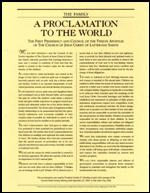Question
Hey Gramps!
I came across a concept that was taught on another Q&A website that states missionaries only hand out the Book of Mormon. Yet it teaches few principles taught in the LDS Church, whereas most principles are found in the Doctrine and Covenants and Pearl of Great Price, which are not advertised by missionaries. See what I’m trying to understand? It’s a concept that kind of stunned me, and I’d like your input on it. How should Christians view the Book of Mormon?
Eli
Answer
Hello Eli,
Thank you for taking a moment to ask this question. As I have pondered this question and as I have read a portion of the linked article, these are three items that I will highlight to answer your question:
1. Book of Mormon: The Keystone of our Religion
2. Misrepresenting the Church’s Beliefs
3. Prayer: To Ask of God
BOOK OF MORMON: KEYSTONE OF OUR RELIGION
At first read, my initial thought was, “What an odd question, as I’m not sure what would be stunning about sharing the Book of Mormon first”? Because if you know the Book of Mormon (which doesn’t just cover a “few” doctrines), then you also know the following quote,
“The first is that the Book of Mormon is the keystone of our religion. This was the Prophet Joseph Smith’s statement. He testified that “the Book of Mormon was the most correct of any book on earth, and the keystone of our religion” (Introduction to the Book of Mormon). A keystone is the central stone in an arch. It holds all the other stones in place, and if removed, the arch crumbles” (emphasis mine).
With the Book of Mormon being the keystone of our religion this is the reason why our missionaries first hand out a free copy of the Book of Mormon. It stands with logic and reason also, that If a person is unable to accept the Book of Mormon, then there is no way they will accept the Pearl of Great Price and the Doctrine and Covenants.
As with building a house, we begin with the foundation. Why? Without a proper foundation, we both, I think, would agree that, in time, the house will crumble. The Book of Mormon is the keystone of our religion, and as such, in almost every case, the missionaries will provide people with a free copy of the Book of Mormon. This is the same for missionaries who are serving in areas where Jesus Christ is unknown, or the people only know of His name. We begin with a proper foundation. As an example, I have a friend who served in one of these areas. They didn’t start with handing out the Book of Mormon, they began with the basic doctrines: 1) Who God is, 2) Why are we here? 3) What do you believe about God? Once these foundational doctrines were established, then a conversation covering scripture, the Bible, and the Book of Mormon would proceed. If we are speaking with another Christian, then it makes sense that we would share the Book of Mormon—Another Testament of Jesus Christ.
MISREPRESENTATIONS OF THE CHURCH’S BELIEFS
The following statement regarding the Book of Mormon is factually false, “it teaches few principles taught in the LDS church” (emphasis mine). My guess is that the individual writing this story hasn’t really studied Church doctrine, nor have they given the Book of Mormon a good read. The Book of Mormon teaches the most important and fundamental doctrines within the gospel of Jesus Christ. Let’s list some, not a few:
- The condescension of God
- The Atonement of Jesus Christ
- Faith, Repentance, Baptism, and the Gift of the Holy Ghost
- The Godhead
- Revelation/Prayer
- The Calling of Prophets and their Prophetic Role
- Priesthood Organization and Priesthood Authority
- Sacrament Prayers
- Chosen, Called Before Being Born
- Receiving His Image in Our Countenance
- Pride/Sin
- The Concept of Restoration
- Premortal Life or our “pre-existence of souls”
- Ministering of Angels
- Charity
This is just a small portion of the teachings and doctrines, which are foundational truths in The Church of Jesus Christ of Latter-day Saints found within the Book of Mormon—not a “few.”
Now, let’s take a moment and address a few points made from the article you have shared that sparked your question. Let’s first begin with this quote that misrepresents teachings that are found within the Doctrine and Covenants and Pearl of Great Price:
“If people knew up front what they were really going to be asked to believe (things such as God once being a man, denial of the Trinity, Satan being Jesus’ brother, pre-existence of souls, etc.), they may not be quite so willing to put aside their skepticism.”
This statement gives me pause, and I wonder if this author has read the Book of Mormon, and if this author has read the Pearl of Great Price and the Doctrine and Covenants. These two other books do not teach that “God once was a man.” So, even if people were handed these books free, this wouldn’t be found within them.
Denial of the Trinity. Our belief about the Godhead and the Trinity is clearly taught already with our Articles of Faith, which are shared in the missionary discussions and which is shared by pamphlets also: “We believe in God the Eternal Father, and in his son, Jesus Christ, and in the Holy Ghost.” We openly share in our lessons as missionaries the Godhead. We share the Godhead when talking about Joseph Smith’s first vision, which is in the Pearl of Great Price. Nothing hidden. It is plainly taught. It is definitely advertised openly. In light of this, the following statement (as provided in the linked article), “which are not advertised by missionaries,” is another misrepresentation of what we do as missionaries. I understand there are individuals who disagree with the teachings of our church, although this is by no means permission to be disingenuous either.
Let’s review another quote from the article provided covering the question we ask people,
“The second thing to realize is that in accepting the Book of Mormon, one is, in fact, accepting Joseph Smith as a prophet. So what about this test of a prophet? Isn’t it legitimate to “give this question up to God?” No, it isn’t. This is because God has already revealed His test for would-be prophets, and it has nothing to do with prayer or feelings, and God has no obligation to answer prayers that He has already answered!” (emphasis mine).
There are three items that I will address in this statement from the article. First, I have always found it intriguing the outright rejection from some Christian teachers that you shouldn’t pray to God and ask Him if something is true. This individual even goes further, calling it an illegitimate thing to do if we have scripture covering some aspect of doctrine or teaching. Why would any Christian tell someone not to pray, not to ask God, to know if something is from Him?
In response to this statement, let’s return once again back to the Book of Mormon—the keystone of our religion. In the book of 2 Nephi, the Book of Mormon teaches this principle clearly:
“For if ye would hearken unto the Spirit which teacheth a man to pray, ye would know that ye must pray; for the evil spirit teacheth not a man to pray, but teacheth him that he must not pray” (emphasis mine). (2 Nephi 32:8)
What a great teaching, and a teaching that is true. The Lord, in the Sermon on the Mount, provided the following counsel to all of us, “Ask, and it shall be given you; seek, and ye shall find; knock, and it shall be opened unto you,” and I find this to be “wise” counsel and counsel that should be followed—not rejected. Where does the Lord ever say in scripture that you can ask but do not ask Me about My servants, the prophets? He doesn’t. He does clearly teach us to ask.
Second is how this statement misrepresents (is misleading) regarding what we do or do not tell people (unless they ask). The statement above is telling readers that we are somehow hiding the correlation between knowing the Book of Mormon is true, and knowing Joseph Smith is a prophet of God. This isn’t hidden, this is the main reason we share Moroni’s promise to all people, which invites people to pray with the following language (Moroni 10: 3-5):
“Behold, I would exhort you that when ye shall read these things, if it be wisdom in God that ye should read them, that ye would remember how merciful the Lord hath been unto the children of men, from the creation of Adam even down until the time that ye shall receive these things, and ponder it in your hearts.
“And when ye shall receive these things, I would exhort you that ye would ask God, the Eternal Father, in the name of Christ, if these things are not true; and if ye shall ask with a sincere heart, with real intent, having faith in Christ, he will manifest the truth of it unto you, by the power of the Holy Ghost.
“And by the power of the Holy Ghost, ye may know the truth of all things.”
Translating the Book of Mormon is one of the works the Lord asked Joseph Smith to accomplish. Joseph Smith accomplished this work, and as such, it is one of his fruits. AND, as we are taught in scripture, by their “works” or “fruit,” ye shall know them. When I served my mission, this is one aspect that was clearly correlated every time we asked someone to read the Book of Mormon, and to pray to know it is true. Because, by default, if a person through asking God comes to know the Book of Mormon is scripture and from God—God bless them—they will also know Joseph Smith is a prophet of God as that was the work he was called to do.
So the notion, as declared by this individual, “Before you fall to your knees, there are some things you need to know that they are not telling you (and won’t unless you ask),” is disingenuous.
Third is the suggestion the author makes here, “This is because God has already revealed His test for would-be prophets, and it has nothing to do with prayer or feelings, and God has no obligation to answer prayers that He has already answered!”
On the cover, we actually, in many ways, agree with this statement, and yet in the context of what is being said, we disagree. The difference is if God has already made something known to you by the power of his Spirit, you don’t need to ask again, and God has no obligation to answer—BUT here is the kicker—because He is a loving God, He still can and at times still does! How great and merciful is our God!
Although He has written something down, He also knows we are not perfect. When we come to Him in humility, even if already written or spoken, He will still answer our sincere prayers to know the truth. It’s odd for me to read or hear a Christian say emphatically with no contest, “Don’t pray, you don’t have to, because it’s already in scripture.” I would rather say, as a Christian, to provide better and more wise counsel with the following language of love, “What you are asking is already written in scripture, but if you are still unsure, please go to the Lord and pray about it and He will answer you.” That seems to be something a Christian would say and invite someone to do, and as already shared in the Book of Mormon, only the “evil spirit” teaches a man not to pray.
PRAYER: TO ASK OF GOD
Let’s review this quote also from the link you have provided, “God never tells us to pray about what is true.”
Again, this is odd to me, coming from one who professes to be a Christian. God definitely invites us to pray to know what is true and what is not! If a Christian is trying to say that we can only rely on scripture to know what is true, then how did that work with our ancestral prophets? What scripture did Adam have when he walked the earth? The obvious answer is—revelation—which can only come through asking God what is true and what is wrong—prayer. What scripture did Noah have? The invitation to pray to know and to receive revelation is truth stemming all the way back to Adam.
Let’s look at this verse of scripture when the apostles are asking Christ a question to know what is true or the truth about a particular situation, “And His disciples asked him, saying, Master, who did sin, this man, or his parents, that he was born blind?”
As the Lord is no longer with us, and we are unable to ask Him questions directly about anything we need to know, fortunately, we can still pray to know and receive revelation. It seems as though this author is alluding to the fact that every gospel question, every scenario, is already given in the Holy Bible. This statement contradicts the Lord, who told us to ask, seek, and knock. The Lord never said don’t ask Me (pray) to know if anything is true! Never!
Let’s review this quote also from the link you have provided, “Feelings are unreliable because they are subjective, easy to produce, and are not meant to discover facts but to tell us how we feel about facts.”
We, as Church members, would agree with this statement as given; however, we would highlight that this individual is conflating “feelings” with the “Spirit” (or spiritual witness from the Spirit). Let’s review what the Spirit does for us in the following verses of scripture,
John 14:26, “But the Comforter, which is the Holy Ghost, whom the Father will send in my name, he shall teach you all things, and bring all things to your remembrance, whatsoever I have said unto you.”
John 15:26, “But when the Comforter is come, whom I will send unto you from the Father, even the Spirit of truth, which proceedeth from the Father, he shall testify of me:”
Galatians 5:22, “But the fruit of the Spirit is love, joy, peace, longsuffering, gentleness, goodness, faith,”
Is the feeling of love, the fruit of the Spirit, unreliable? Is the spiritual witness from the Spirit of truth unreliable? Is peace, a feeling and fruit of the Spirit unreliable? Is the “Comforter” (intriguing the spirit is described as a feeling of comfort) who will teach us all things unreliable? Was this experience from the apostles unreliable when their hearts did burn within them (a feeling):
“And their eyes were opened, and they knew him; and he vanished out of their sight. And they said one to another, Did not our heart burn within us, while he talked with us by the way, and while he opened to us the scriptures?” (Luke 24:31-32)
Not in any way did their feelings deceive them. It provided further witness and a witness from the Spirit of the Lord they could trust.
It is the same for the Book of Mormon and why the Book of Mormon is given out freely. It is the keystone of our religion. It teaches not just a few but the majority of what we believe as members of the Church. The other books of scripture are indeed “advertised” and taught to people whom the missionaries meet with. In our lessons, missionaries will teach from the Bible, the Book of Mormon, Doctrine and Covenants, and the Pearl of Great Price.
Not only that, in accordance with inviting people to pray about the Book of Mormon and to know if it is true (after they have read it), we will even invite people to pray to know the Doctrine and Covenants and the Pearl of Great Price is true. We practice what we teach, if you lack wisdom, ask God.
I remember fondly a member of the Church who was a convert reading the Doctrine and Covenants and read a passage she disagreed with. She even said to herself, “This is not true, it can’t be”! She was invited to pray, and she received a wonderful answer—not a feeling—but an answer from God. The devil is who teaches us not to pray. The Lord teaches us to pray and to ask Him anything if we lack wisdom. I can’t trust anyone who tells me not to pray, as that individual is telling me to trust in man (the arm of flesh—another teaching in the Book of Mormon) and not in God. I will trust in God and pray.
Gramps







